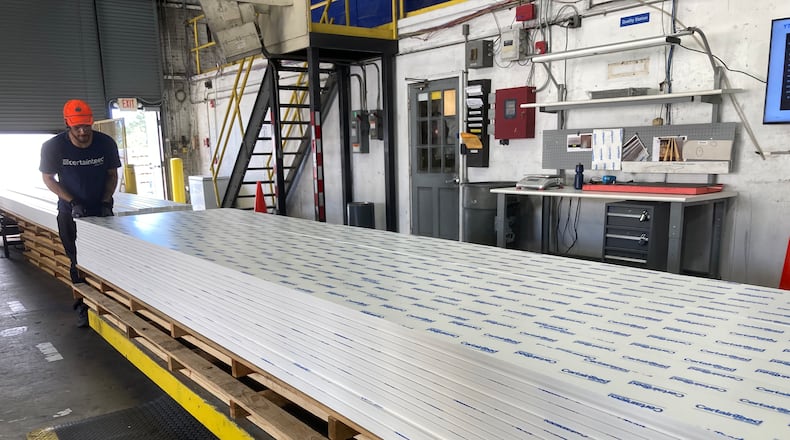As assembly lines clanked inside Saint-Gobain’s factory in Social Circle, the CEO of the France-based company that makes housing construction materials recently strolled through and spelled out what’s driving his company’s expansion in Georgia.
“We are investing in our capacity here because the market is growing,” said Benoit Bazin, CEO of Saint-Gobain. “Where we think the population growth is going to be, that is where we are going to invest.”
In this massive plant, walking distance from the town center of Social Circle, Saint-Gobain is making various kinds of siding and corners that are placed within homes as part of construction or renovation. Last year the company expanded its presence in Social Circle, which is about 45 miles east of Atlanta, with the opening of a new interior products facility.
On a recent October morning, workers were training on a new assembly line, put together in Oregon and shipped to Georgia.
The company has also invested more than $100 million on an expansion of a plant in Peachtree City, done a $28 million investment at its facility in Dublin and built a new factory in Conyers, in addition to facilities in Norcross and Athens.
Manufacturing isn’t the dominant sector it was several generations ago, but it is growing again.
Credit: Georgia Department of Economic Development
Credit: Georgia Department of Economic Development
Saint-Gobain’s headquarters are just across the Seine from Paris, but it has offices and factories in 76 nations and 168,000 employees who design, make and distribute a variety of construction and industrial products.
Saint-Gobain has received incentives from the state of Georgia and from local economic development groups, Bazin said, adding “It’s very important to have a good partnership with local authorities.”
“You want traffic lights and road improvements. And you want training for the workforce,” he said.
He noted many states now offer incentives, but that only levels the playing field. “You talk to them all, and you still chose the location where it’s the most beneficial,” he said.
Expansion in Georgia
Nationally, manufacturing has rebounded from the coronavirus pandemic recession to recover all the jobs it lost — the first time that has happened — according to the Economic Innovation Group, a bipartisan research and policy firm based in Washington, D.C.
Georgia is among the leaders in the growth, partly because it has become a center for electric vehicle development, the group said. While the sector’s market challenges have slowed growth, Georgia is home to a new Hyundai Motor Group auto plant, as well as battery makers like SK Innovation.
The state has about 433,000 manufacturing jobs — about 30,000 more than in early 2020 and 63,000 more than at the depth of the pandemic, according to the Bureau of Labor Statistics.
Foreign-owned firms are a significant part of that.
European and Asian-based companies or their subsidiaries own 3,369 facilities employing more than 160,000 people, according to the Georgia Department of Economic Development. Germany is the largest in Georgia with 650 facilities, but France-based companies have about 341 facilities with nearly 14,000 jobs, officials said.
The investments are endorsements of Georgia, said Katie Deutschler, a partner and manufacturing specialist at Moore Colson, an Atlanta-based accounting and advisory firm.
With two huge, busy seaports, the busiest airport in the world and a government that nurtures investment, the state is attractive, she said. “Georgia has historically been a very business-friendly state. It’s logistics and connectivity. And we currently are building a really strong manufacturing ecosystem.”
A new manufacturer can find an able and willing workforce, she said.
Advantages of local manufacturing
Saint-Gobain has nearly 600 employees in Georgia, a presence that is largely tied to the fate of the housing market.
Plants in Georgia mainly make materials for either new construction or renovations. The cost of shipping — especially for heavy items — adds to the incentive to manufacture in the same region as the ultimate users live.
In Social Circle, Saint-Gobain churns out the trim that is placed around windows and doors, made of polyvinyl chloride, or PVC.
It’s a good business to be in, with demand likely to be robust for the indefinite future, said Mark Rayfield, chief executive of Saint-Gobain North America.
After the collapse of the housing boom triggered the Great Recession, construction of new homes was near zero for years and when it picked up, it did not come close to matching the growth of the population.
“We are conservatively about 4 million homes underbuilt in the U.S.,” Rayfield said.
Moreover, among the vast number of older homes there is a huge need for renovations and repair, he said. “So, we think that short term, medium term and long term, the fundamentals for housing are strong, especially in the Southeast.”
Credit: Natrice Miller / Natrice.Miller@
Credit: Natrice Miller / Natrice.Miller@
About the Author
Keep Reading
The Latest
Featured





